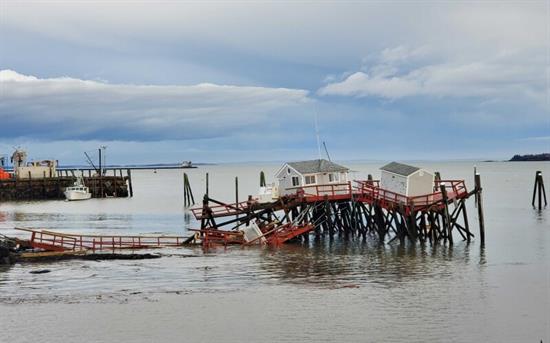Press Releases
Pingree, Murphy Lead Bipartisan Effort in the House to Support Working Waterfronts Affected by Natural DisastersThe bicameral Working Waterfronts Disaster Mitigation Tax Credit Act, introduced in the Senate by Sens. King and Cassidy in August, would provide working waterfronts with a 30% tax credit on up to $1 million in mitigation expenses, adjusted for inflation annually
Washington,
October 1, 2024
U.S. Representatives Chellie Pingree (D-Maine) and Greg Murphy, M.D. (R-N.C.) today introduced bicameral, bipartisan legislation to offer a disaster mitigation tax credit for working waterfronts. The Working Waterfronts Disaster Mitigation Tax Credit Act would allow working waterfronts situated along coastal areas and navigable waterways to claim a 30 percent tax credit on mitigation costs, up to $1 million, with annual adjustments for inflation. U.S. Senators Angus King (I-Maine) and Bill Cassidy (R-La.) introduced the companion legislation in the Senate this August. “Working waterfronts are rapidly disappearing nationwide due to heavy development pressure, and climate change is further threatening their survival. More frequent, intense storms, floods, and rising sea levels mean our coastal communities will continuously be faced with the kind of devastation Maine endured this past winter,” said Congresswoman Pingree. “Our bipartisan legislation offers a critical lifeline to working waterfronts, ensuring they have the resources to protect their infrastructure, jobs, and way of life from future disasters. By helping mitigate these risks, we are not only investing in the resilience of our coastal areas but also in the long-term sustainability of our working waterfronts.” “Properties used for commercial purposes in areas at risk of erosion and intense weather systems face unique challenges,” said Congressman Murphy, M.D. “As the representative of more than 80% of North Carolina's coastline, I understand how tide changes and storms can jeopardize local economies that conduct business along our shores. Ensuring the resiliency of waterfront commerce is essential to our coastal communities and this legislation enables businesses to mitigate the financial costs that come with working in these areas.” “Maine’s coastal communities are changing. From a warming climate to an evolving economy, the Gulf of Maine faces both historic opportunities and challenges that will define our state’s success for generations,” said Senator King. “In the Senate, I introduced the bipartisan Working Waterfronts Disaster Mitigation Tax Credit Act to provide working waterfronts up and down the coast of Maine with the necessary financial resources to proactively adapt to the rapidly shifting dynamics of natural disasters affecting economic and tourism operations — and I am excited to see the House of Representatives take steps to do so as well with a companion bill. This bipartisan, bicameral legislation will help ensure our waterfront businesses have the necessary tools and resources to thrive for years to come.” “Island Institute applauds Representative Pingree for introducing the Working Waterfronts Disaster Tax Credit Act. This proposed tax credit will be an important resource for small business owners, many of whom are still grappling with damage caused by catastrophic storms in January. Maine’s working waterfront businesses need all the tools they can get to help rebuild and prepare for the next storm. This essential piece of legislation assures Maine’s working waterfront businesses can take steps today that will help them to prepare for future impacts of climate change,” said Kimberly A. Hamilton, PhD, President of Island Institute. Pingree and Murphy also recently introduced the Prevent Environmental Hazards Act to give homeowners insured by the National Flood Insurance Program greater flexibility to manage natural disasters. Pingree has long advocated for federal resources to help Maine communities preserve and expand shoreline access and infrastructure for water-dependent industries such as fishing, boat building, and aquaculture. She first introduced legislation to protect working waterfronts in the 111th Congress and is the author of the bipartisan Keep America’s Waterfronts Working Act, which would support coastal communities grappling with the climate crisis and preserve the character of coastal communities by protecting jobs, commercial activities, and public access to America’s coast. ### |

